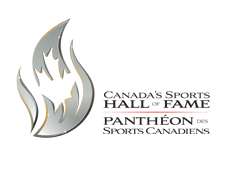Home | Major Sporting Events | British Empire Games/Commonwealth Games
1954 British Empire and Commonwealth Games - Vancouver
PreviousNext
Postwar optimism permeated the fifth British Empire and Commonwealth Games, held in Vancouver in 1954, as organizers hoped to rekindle athletic development that had been stifled in Canada by the Second World War. Since the inaugural British Empire Games in 1930, the event had grown in prestige, with participants setting world records and providing competition of the highest caliber.
Additionally, in the tense climate and bitter international rivalries of the burgeoning Cold War, the fifth British Empire and Commonwealth Games demonstrated to the world "that friendliness and sportsmanship could flourish" alongside the desire to win.
Setting a new record for participation, 24 members of the Commonwealth sent nearly 800 athletes to Vancouver in 1954. Canadians provided their share of memorable stories, including the brilliant upset of the heavily favoured British rowing team in the 2,000-metre course by The Canadian Eight, "a crew of green kids from the University of British Columbia". Their success was partially due to the ambitious, disciplined mentorship of Frank Read, a legendarily but demanding transformative coach. Building character as well as skill, Read's team captured Canada's first-ever gold medal for rowing in the history of the British Empire and Commonwealth Games.
Canadian athletes also did exceptionally well in the weightlifting competitions. Keevil Daly won gold for Canada in Middle Heavyweight lifting, matched by Gerry Gratton in the Light Heavyweight category. In front of a capacity crowd, Vancouver-born Doug Hepburn also won gold in the Heavyweight Class. A self-taught strongman, Hepburn had taken up weightlifting as a young man, overcoming a weakness in his leg caused by failed surgery to correct a club foot. Despite years of being passed over by Canadian weightlifting organizations and paying his own way to international championships, Hepburn never lost confidence in himself. In 1954, he was at the height of his abilities and finally starting to gain national recognition. Hepburn had been awarded the Lou Marsh Memorial Trophy as male athlete of the year in 1953 after winning the World Heavyweight title. Further redemption followed his success at the British Empire and Commonwealth Games in Vancouver, when he was named Man of British Columbia for 1954.
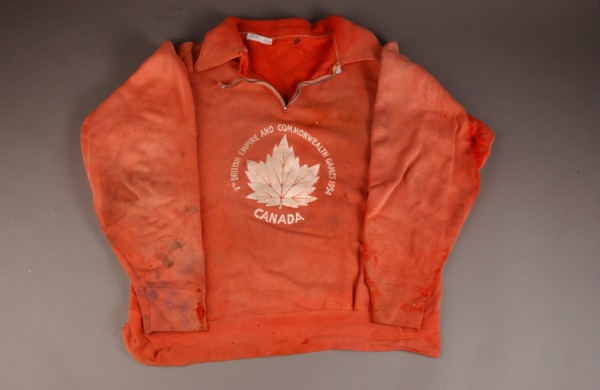
Gerard Coté wore this Team Canada sweatshirt at the 1954 British Empire and Commonwealth Games in Vancouver where he competed in the marathon competition. He won the Boston Marathon four times between 1940 and 1948.
Collection: Canada's Sports Hall of Fame
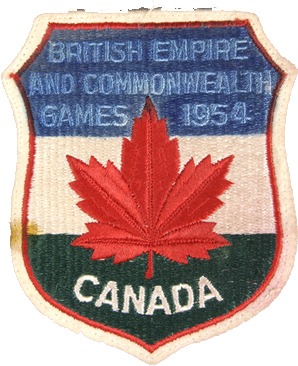
As the host city Vancouver set new standards for the organization and presentation of a multi-sport competition. Twenty-four nations were represented with eight countries, including the Bahamas, Pakistan and Kenya, sending a team for the first time. There were many exciting competitions and perhaps the most highly anticipated was the mile race between Roger Bannister of England and John Landy of Australia. The "Miracle Mile" saw both men run the race in under four minutes, with Bannister as the winner.
Collection: Canada's Sports Hall of Fame
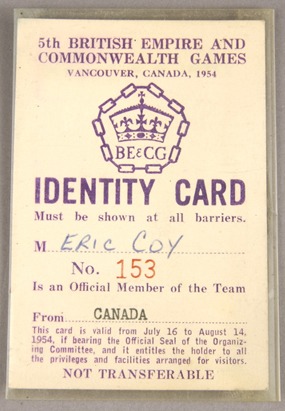
Eric Coy was a shot putter and discus thrower. He competed at the 1938 Olympic Games where he won two medals and the 1948 Olympic Games. His identitification card for Vancouver, which was his final major competition, has the Games logo of crown and chain. The Eric E. Coy Trophy donated in his name is awarded annually by Athletics Canada to the top junior athlete in athletics.
Collection: Canada's Sports Hall of Fame
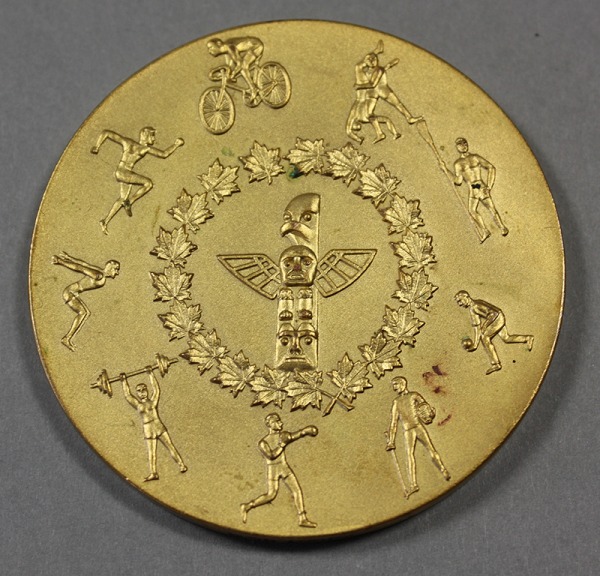
Vancouver incorporated the culture of the Northwest Coast First Peoples into the Games. The totem pole is surrounded by images of the nine sports in which the athletes competed. These were all individual sports with team sports being introduced in 1998.
Collection: Canada's Sports Hall of Fame
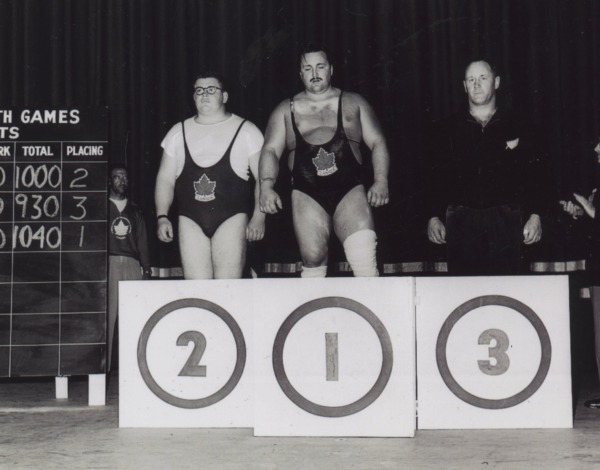
Doug Hepburn set a new British and Commonwealth Games record with a combined total lifts of 1040 pounds /471.74 kilograms. Although he was known as a strong man and often performed feats of strength at shows across Canada, he was also a songwriter and singer and wrote essays and poems. He had a competitive spirit with a passion that went beyond sport.
Collection: Canada's Sports Hall of Fame
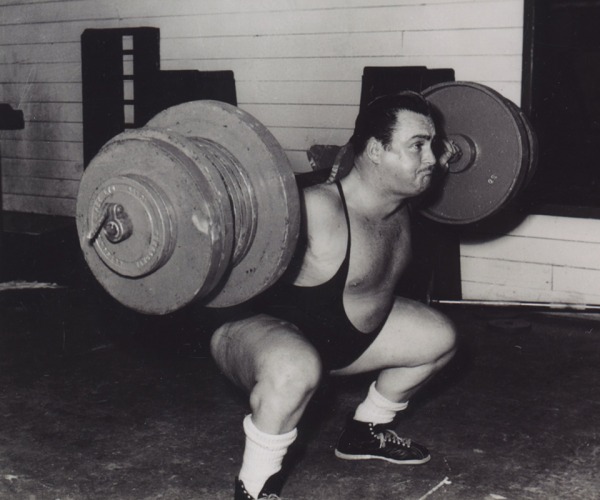
Hepburn is quoted as saying he was only a normal, regular man, not naturally big at all. At a time when there was little training available he learned how to use exercises, repetitions and intensity to progress in his sport. His perseverance and willingness to train led him to become a champion.
Collection: Canada's Sports Hall of Fame
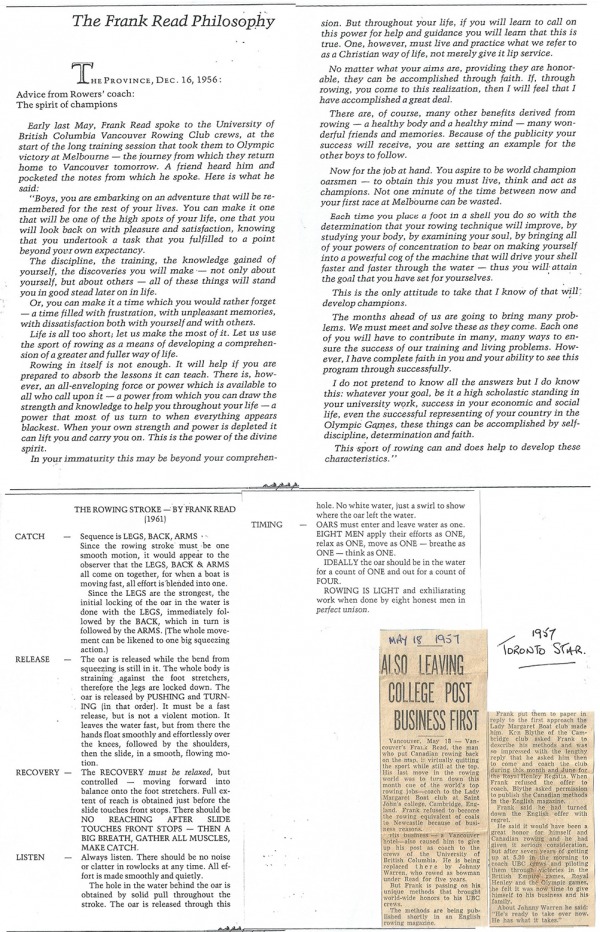
Frank Read was a leader and a mentor as shown in his speech to his team that competed at the 1954 British and Commonwealth Games: "Let us use the sport of rowing as a means of developing a comprehension of a greater and fuller way of life".
Collection: Private collection: George T. Read and John Cartmel
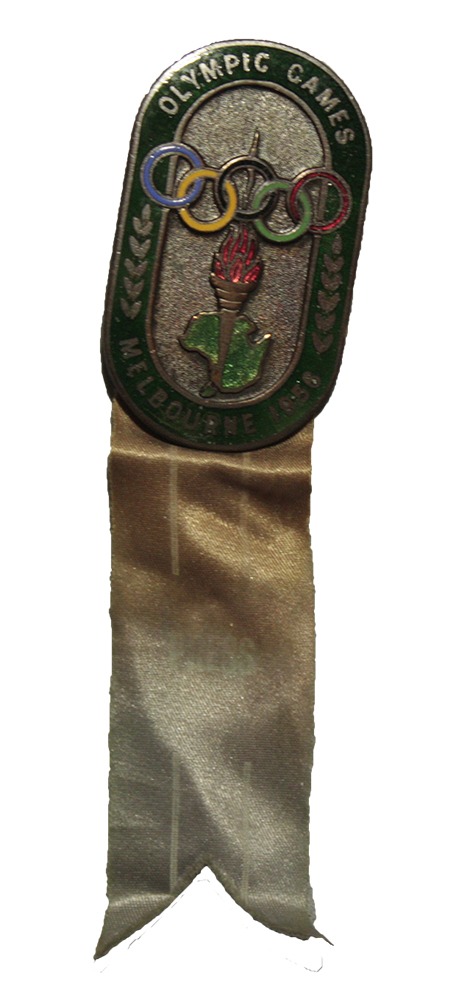
Frank Read took his men's eights team to the 1956 Olympic Games in Melbourne where they won the silver medal. His passion and focus was key in all his work as a coach and mentor. The athlete badge for the Games included the Games logo with the Olympics rings and torch above the continent of Australia.
Collection: Private collection: George T. Read and John Cartmel
Previous Next
